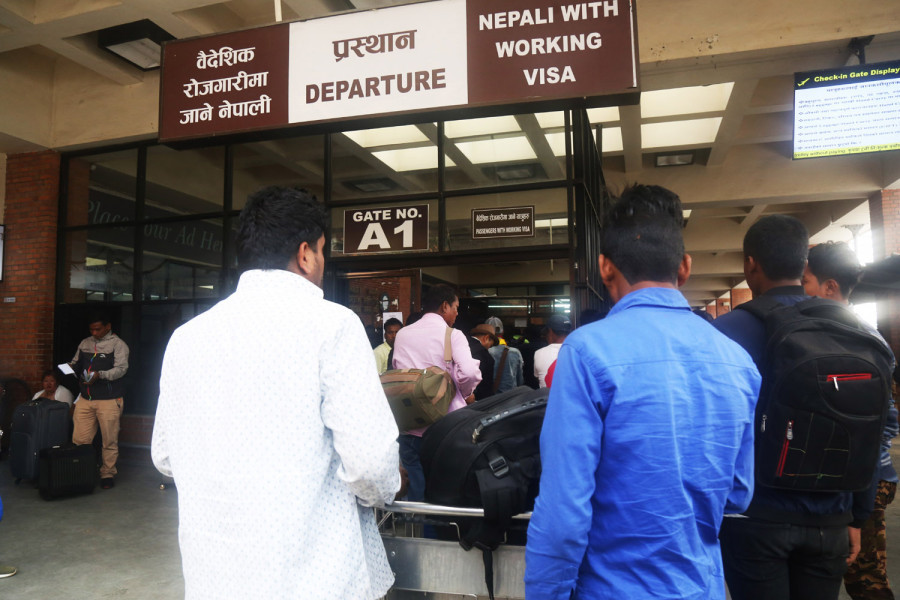National
Pre-departure orientation training providers found not even conducting training for migrant workers
A majority of pre-departure training providers, which were inspected by the government body, were found to be flouting rules. Some did not have even classrooms for conducting training.
Chandan Kumar Mandal
With the aim of keeping Nepalis safe and protected during their work period in foreign labour destinations, the government recently upgraded the curriculum for pre-departure orientation.
However, ensuring safety and protection of migrant workers through the upgraded pre-departure training faces a major hurdle at the home front.
The Department of Foreign Employment, the government authority overseeing the foreign employment sector, has found out that many pre-departure training providers were not even conducting the mandatory training for aspiring migrant workers. According to Kumar Prasad Dahal, a recent monitoring found that a majority of pre-departure training providers had not been conducting orientation sessions for the workers.
“There are orientation training providers registered with the department. But when we inspected them, we found that they were not conducting the training,” Dahal told the Post. “As most of the foreign-employment related services are available, they were misusing the online system.”
The department, which has intensified its monitoring of recruitment agencies following the resumption of labour migration, has also started to carry out surprise inspections of training centres lately.
In the last two weeks, the department inspected more than 15 training institutes, according to Dahal.
“Most of these centres had not been conducting training and were simply registering the names of candidates online to our system,” said Dahal. “At some places, our team found out that there were no candidates who were registered for the training.”
Pre-departure training, which was made mandatory in 2004, is considered one of the most significant parts of the labour migration process. Through a two-day training, aspiring migrant workers receive handy information about the labour destination countries, its rules and regulations, traffic rules, labour laws and local culture and traditions, among other areas. Besides, the training also provides information on how to remain safe at the workplace and in the country in general.
However, for several years pre-departure orientation training providers have been accused of colluding with recruiting agencies to issue fake certificates to migrant workers without conducting the mandatory training.
Besides, inadequate and outdated information shared has also been questioned for failing to protect workers in destination countries, where hundreds of Nepalis die and get injured every year.
In a bid to make workers aware of the ways to minimise workplace accidents and road accidents and to respond to other risks during their working period, the government recently updated curriculum and also included chapters on physical and mental health.
But the training providers are simply flouting the usual process.
As per the standard procedures, training providers must update the candidates’ names on the Foreign Employment Information Management System (FEIMS), an integrated online platform where all major stakeholders of foreign employment are interconnected and share details. The next day, these candidates have to appear in person to sit for 12 hours of orientation training.
What these training providers are doing is merely registering the names of the candidates but not conducting actual training, said Dahal.
“A day before the training, they have to update the list by 1:00 pm. So we know which centres are conducting the training the next day,” said Dahal. “They upload their names and other details, which they have been doing from anywhere as the equipment can be carried to any place easily. They are manipulating the online system as it cannot read from where the details were filled up, nor can it detect fake details.”
Only when a worker’s orientation details are matched at labour employment offices do they get the final permit for working abroad. Their orientation training and biometric details also have to match at the Labour Desk at Tribhuvan International Airport before their departure.
Raja Ram Gautam, president of the Federation of Foreign Employment Orientation Associations Nepal, which represents 155 organisations providing pre-departure training for migrant workers, admitted that some agencies had been involved in such illegal activities.
“We admit that some service providers have been flouting the rules. This should not happen. We have been requesting such agencies to not engage in such malpractices,” said Gautam. “Some agencies have been taking advantage of the loopholes in the system.”
A total of 160 private pre-departure training providers are registered with the department. A male worker pays Rs700 for attending the pre-departure training whereas the fees for female migrant workers is borne by the Foreign Employment Board.
Gautam, however, points out that there are a number of technical issues which the department should solve for making the overall process easier for training providers and migrant workers.
“There is a small time slot of 12:30 pm-1:00 pm for updating the name list of candidates. The classroom looked empty because the candidates whose names were registered did not show up for the training the next day. In such a situation, training providers alone cannot be blamed,” said Gautam.
Following the raids, the department has sealed those offices that were not complying with the rules.
“Forget about running classes, some of them did not even have a physical classroom. Such malpractices expose their lack of professionalism,” said Dahal, the director general of the department.
“During the inspection, they would even gather fake trainees to show that they had real candidates.”




 9.6°C Kathmandu
9.6°C Kathmandu














